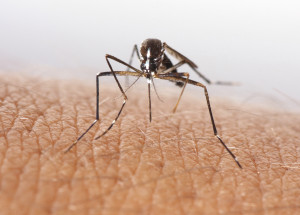Mosquito Control
It has been a wet and rainy month here in Georgia this February, and as March rolls around it shows no sign of stopping. Rainy days mark the coming of spring, and while that means the coming of blooming flowers and sunny days, it also signals another return: mosquito activity!
The truth is, while many pests dislike the rainy season, mosquitoes can thrive in wet and rainy environments. In fact, they are most prevalent when the weather outside is wet.
But why is this? What makes mosquitoes more prevalent during and after rain showers?
Essentially, mosquito activity is directly related to moisture levels because female mosquitoes lay their eggs in pools of standing water. Without nearby standing water, mosquitoes are unable to reproduce and thus they will only gather in areas that match this environment. It is for this reason that mosquitoes are so prevalent in swamps, bogs, and other high moisture ecosystems.
Further, mosquitoes also enjoy environments that are warm and humid, which any Georgia resident knows we have in spades. After rainfall, your backyard will have areas such as divots and tree stumps that collect runoff water. While these temporary pools will eventually dry up, they will last more than long enough to host a new generation of mosquito larvae.
This becomes an expansively worse problem when the rain is frequent and heavy. Mosquitoes are given multiple opportunities to reproduce and the population around your yard can grow exponentially.
The fact is, mosquitoes are one of the infamous pests in the world. They can sometimes carry diseases depending on the area. Each year, billions of dollars are spent in preventative treatment products and medical expenses fighting against such illnesses.
While you are unlikely to encounter any mosquito-borne illness in the United States, mosquitoes can still be a major nuisance pest. They can ruin outdoor activities such as BBQ’s, swimming, or picnics. If the infestation grows large enough, you can find yourself unable to enjoy your own back yard once mosquitoes have staked a claim.
Before you miss out on any sunny days, it is critical to take the steps that you need to protect your yard from mosquitoes. Mosquito treatments vary depending on whether or not you want a longterm preventative solution or just a short term population reduction for a single event or quick fix. The best way to identify what is best for your property is by scheduling an inspection of your yard with a trained pest control professional.
That said, pesticide products are not the complete solution for a mosquito-free yard. The fact is, there is a lot you can do to reduce mosquito activity just by controlling environmental factors. While treatment is typically a part of any effective treatment, controlling for conducive conditions is critical to solving your pest problems longterm.
As we already mentioned, standing water sources are a key part of mosquito reproduction. If you can reduce standing water in your yard, you can reduce mosquito activity. This type of preventative work can take thousands of different forms, from improving the irrigation and runoff in your yard to just picking up filling stumps and divots. If you are unsure what areas of your yard are exacerbating mosquito activity, your pest control provider can advise you on problem areas during an inspection.
Mosquitoes are a tough problem to handle, but with the right team on the job, the fix couldn’t be simpler. If you are dealing with mosquito problems this spring, Canton Termite and Pest Control is the one-call fix! We’ll inspect your yard to identify any problem areas and conducive conditions that let pests thrive! From there, we’ll construct a custom, 100% satisfaction guaranteed treatment plan to target and eradicate pest activity!
So don’t let pests ruin the return of spring, call us TODAY at 770-479-1598!

